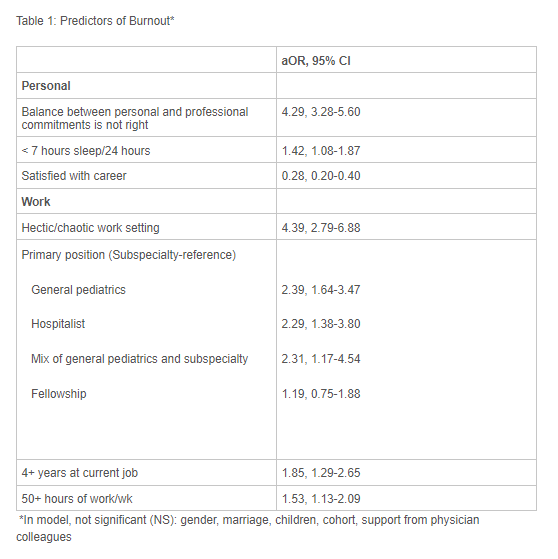Mary Pat Frintner, MSPH,1 Amy J Starmer, MD, MPH2, 3
1Research, American Academy of Pediatrics, Elk Grove, United States; 2Doernbecher Children's Hospital, Oregon Health and Science University, Portland, United States; 3Boston Children's Hospital, Boston, United States
BACKGROUND: Reports of job burnout are higher among physicians than other US workers. Though pediatricians report lower rates than most specialties, little is known about which factors contribute to pediatrician burnout.
OBJECTIVE: Explore personal and work factors related to perceived burnout.
METHODS: We analyzed national, weighted data collected in 2013 from PLACES, an AAP study of pediatricians 2-4 years (recent grad cohort) and 9-11 years (early career cohort) post-residency (n=1804). Burnout was measured as a single item (I am currently experiencing burnout in my work); responses were dichotomized: strongly agree/agree vs strongly disagree/disagree/neither). Predictors of burnout were assessed in logistic regression and included work and personal factors, including satisfaction with career.
RESULTS: 93% of PLACES participants completed the survey (n=1669). While most (84%) report satisfaction with their career, 28% reported current burnout in their work. In multivariable analyses, poor balance between personal and professional commitments and hectic work setting were the strongest predictors of burnout (see table). Those currently in general pediatrics or hospitalist positions are more likely than those in subspecialty positions to report burnout. Pediatricians who report working more years in their current job and more hours per week and those less satisfied with their career also report more burnout.

Conclusion: While most young pediatricians do not report current burnout in their work, factors that might contribute include general pediatric and hospitalist positions, unbalanced work and home commitments, and hectic work settings.